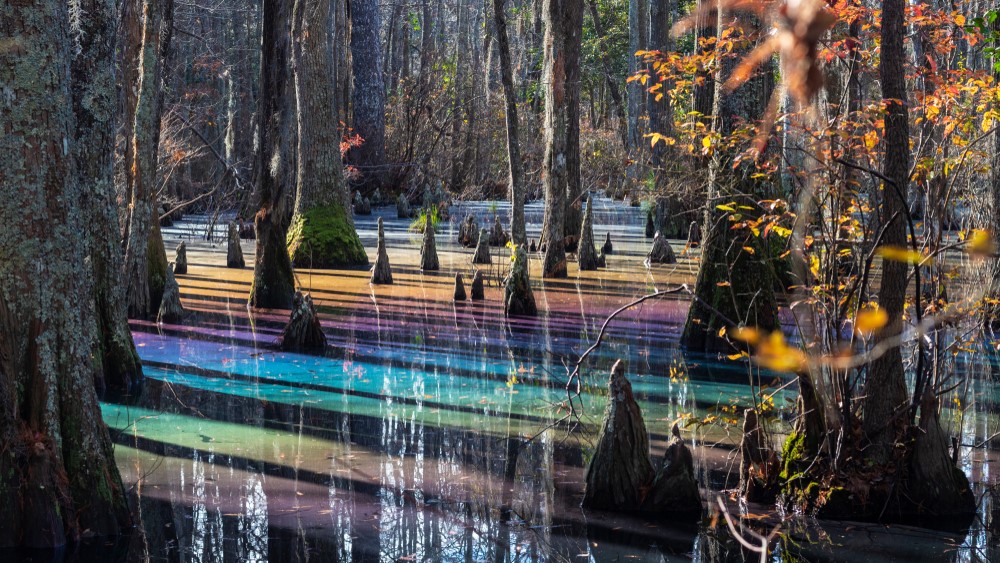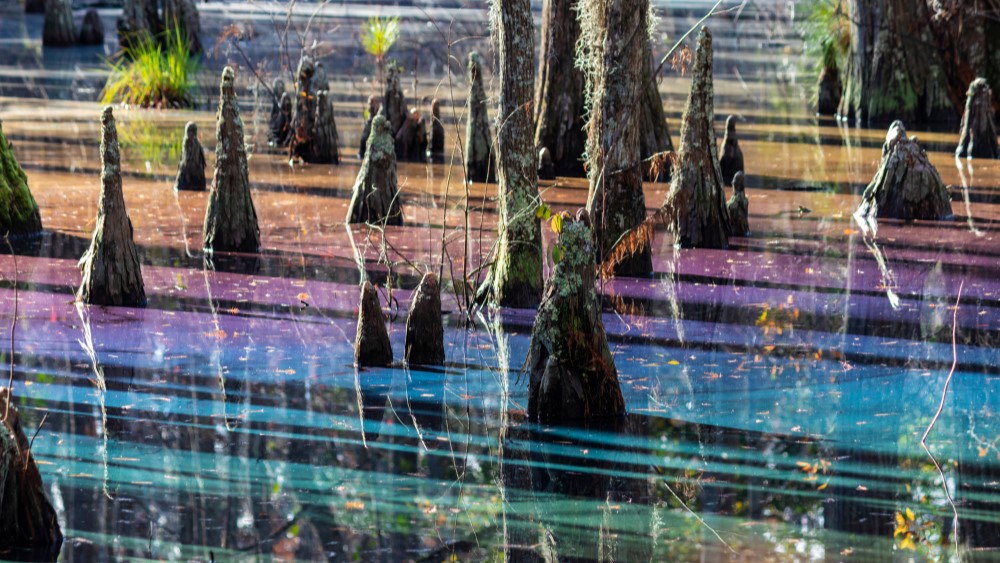Rainbow swamp: The flooded forest in Virginia that puts on a magical light show every winter
Every winter, when sunlight hits at the right angle, visitors to Virginia's First Landing State Park are treated to a mesmerizing rainbow light show courtesy of the park's bald cypress swamp.

Name: Bald cypress swamp
Location: First Landing State Park, Virginia Beach, Virginia
Coordinates: 36.90671813879774, -76.02093550787815
Why it's incredible: Under the right light in winter, the swamp becomes a giant rainbow.
Virginia's "rainbow swamp" is a flooded forest whose waters take on a magical, multicolored sheen in the winter months. Under certain lighting conditions, the swamp turns into a giant, luminous rainbow broken up by the shadows of bald cypress trees (Taxodium distichum) and cypress knees — cone-shaped humps that grow vertically above the trees' roots.
The rainbow swamp is one of many along the Bald Cypress Trail at First Landing State Park, which is located where English colonists first landed in 1607, according to the park's website. Most days of the year, the swamp looks like any other forested wetland — rather murky and opaque. But occasionally, in late fall and winter, the stagnant pool puts on a dazzling light show.
Related: Extremely rare 'rainbow clouds' light up Arctic skies for 3 days in a row
The rainbow effect results from leaf decay in the swamp during fall and winter, according to a Facebook post from March 2024. "The trees drop their needlelike leaves in the fall that decompose in the swamp and the resulting matter, when hit at just the right angle by sunlight, gives off this prismatic appearance," park representatives wrote in the post.
Bald cypress leaves contain natural oils that ooze into the swamp as the leaves break down. The oils then separate from the water and form a film on the surface that reflects light much like a puddle of gasoline would. Biological processes in the soil, resulting from bacteria breaking down iron, can also contribute to the rainbow effect, Jeff Ripple, a former Florida swamp walk leader, told the BBC in 2018.

The longer the swamp goes undisturbed, the stronger the effect grows. "Movement by sheet flow, current or wind disturbance would destroy the fragile rainbow film," Ripple said, adding that the effect is usually visible in smaller pools of water.
Rainbow swamps occur throughout southern US states, overlapping with the range of bald cypress trees. Tallahassee, Florida, for example, is home to a flooded forest that lights up like a disco ball around mid-February. "I have seen this occur about 10 times in the 40 years I have lived here," Michael Hussey, a retired engineer who owns the land the swamp sits on, told the BBC. "It's beautiful to see."
Sign up for the Live Science daily newsletter now
Get the world’s most fascinating discoveries delivered straight to your inbox.
Discover more incredible places, where we highlight the fantastic history and science behind some of the most dramatic landscapes on Earth.

Sascha is a U.K.-based staff writer at Live Science. She holds a bachelor’s degree in biology from the University of Southampton in England and a master’s degree in science communication from Imperial College London. Her work has appeared in The Guardian and the health website Zoe. Besides writing, she enjoys playing tennis, bread-making and browsing second-hand shops for hidden gems.










